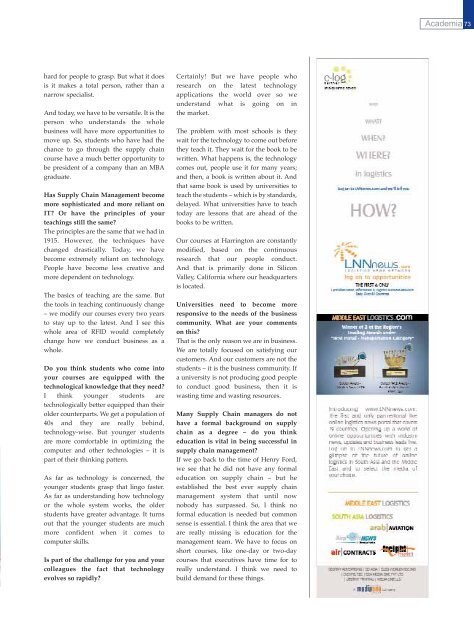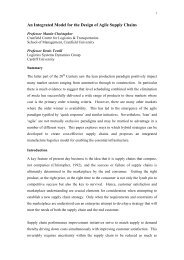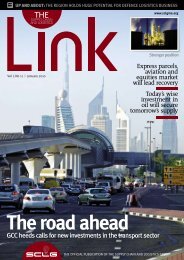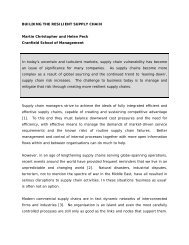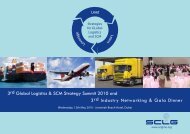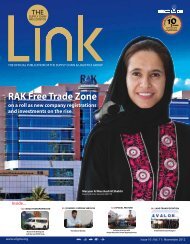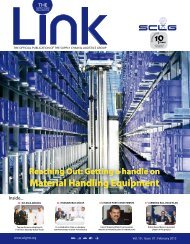Link Magazine 19 - SCLG
Link Magazine 19 - SCLG
Link Magazine 19 - SCLG
- No tags were found...
Create successful ePaper yourself
Turn your PDF publications into a flip-book with our unique Google optimized e-Paper software.
Academia 73hard for people to grasp. But what it doesis it makes a total person, rather than anarrow specialist.And today, we have to be versatile. It is theperson who understands the wholebusiness will have more opportunities tomove up. So, students who have had thechance to go through the supply chaincourse have a much better opportunity tobe president of a company than an MBAgraduate.Has Supply Chain Management becomemore sophisticated and more reliant onIT? Or have the principles of yourteachings still the same?The principles are the same that we had in<strong>19</strong>15. However, the techniques havechanged drastically. Today, we havebecome extremely reliant on technology.People have become less creative andmore dependent on technology.The basics of teaching are the same. Butthe tools in teaching continuously change– we modify our courses every two yearsto stay up to the latest. And I see thiswhole area of RFID would completelychange how we conduct business as awhole.Do you think students who come intoyour courses are equipped with thetechnological knowledge that they need?I think younger students aretechnologically better equipped than theirolder counterparts. We get a population of40s and they are really behind,technology-wise. But younger studentsare more comfortable in optimizing thecomputer and other technologies – it ispart of their thinking pattern.As far as technology is concerned, theyounger students grasp that lingo faster.As far as understanding how technologyor the whole system works, the olderstudents have greater advantage. It turnsout that the younger students are muchmore confident when it comes tocomputer skills.Is part of the challenge for you and yourcolleagues the fact that technologyevolves so rapidly?Certainly! But we have people whoresearch on the latest technologyapplications the world over so weunderstand what is going on inthe market.The problem with most schools is theywait for the technology to come out beforethey teach it. They wait for the book to bewritten. What happens is, the technologycomes out, people use it for many years;and then, a book is written about it. Andthat same book is used by universities toteach the students – which is by standards,delayed. What universities have to teachtoday are lessons that are ahead of thebooks to be written.Our courses at Harrington are constantlymodified, based on the continuousresearch that our people conduct.And that is primarily done in SiliconValley, California where our headquartersis located.Universities need to become moreresponsive to the needs of the businesscommunity. What are your commentson this?That is the only reason we are in business.We are totally focused on satisfying ourcustomers. And our customers are not thestudents – it is the business community. Ifa university is not producing good peopleto conduct good business, then it iswasting time and wasting resources.Many Supply Chain managers do nothave a formal background on supplychain as a degree – do you thinkeducation is vital in being successful insupply chain management?If we go back to the time of Henry Ford,we see that he did not have any formaleducation on supply chain – but heestablished the best ever supply chainmanagement system that until nownobody has surpassed. So, I think noformal education is needed but commonsense is essential. I think the area that weare really missing is education for themanagement team. We have to focus onshort courses, like one-day or two-daycourses that executives have time for toreally understand. I think we need tobuild demand for these things.


